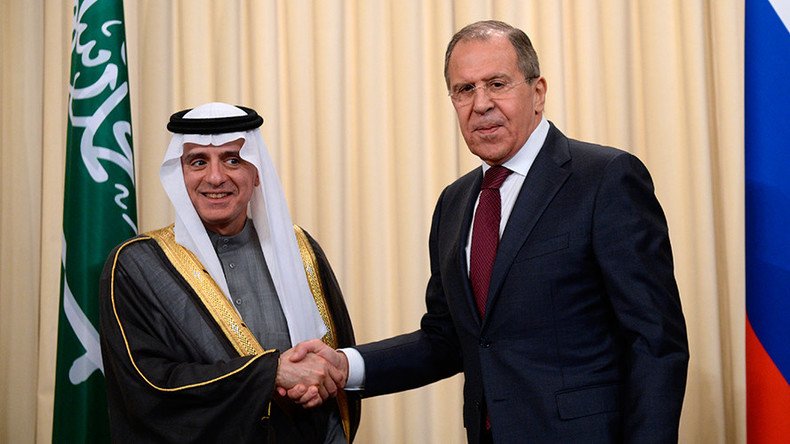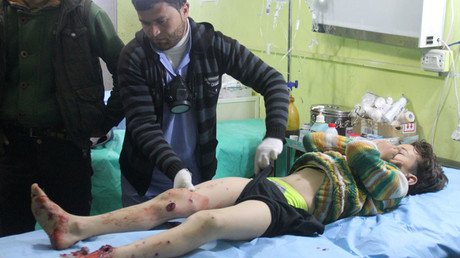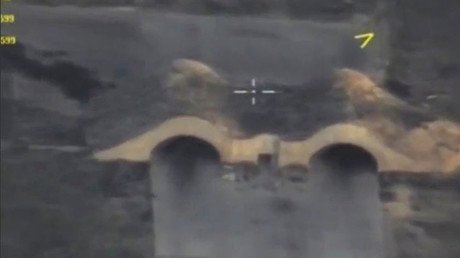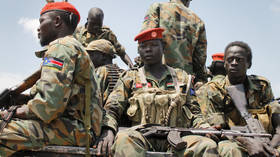Russian and Saudi FMs clash over Syria & Iran

Iran’s involvement in Syria is where Moscow and Riyadh “are mildly speaking, not matching,” the Russian Foreign Minister has said after hosting his Saudi counterpart. The alleged chemical attack in Syria has proven another point where Russia and Saudi Arabia are at odds.
Riyadh is standing against the involvement of Iran’s Islamic Revolutionary Guard Corps (IRGC) and the Hezbollah group in Syria, Saudi Foreign Minister Adel Jubeir said at a news conference after talks with Sergey Lavrov in Moscow.
“We believe that they have no place in Syria or in any other part of the world. These groups influence the situations in Iraq, Syria, Lebanon, the Gulf countries, Yemen. Hezbollah is carrying out its operations in various Middle East regions and follow’s Iran’s agenda,” Jubeir said.
“We would like to put an end to Iran’s involvement in the region,” he added.
Russia’s Foreign Minister countered this view, noting that Iran, as well as Hezbollah, are operating in Syria on President Bashar Assad’s official request.
“We don’t see Hezbollah as a terrorist organization. We believe that both of them [Iran and Hezbollah] – like Russia’s Air Forces – came to Syria following the request of the legitimate government,” Lavrov said.
“We know that our approaches are – mildly speaking – not matching, but we are sure that we need all Syrian parties without exceptions and all international players influencing these parties to join us to deal with this crisis,” Lavrov said.
Both ministers agreed that Teheran is one of the custodians of the ceasefire regime in Syria as outlined in the Astana agreement.
Apart from Tehran’s involvement in Syria, the two countries are also at odds over the US missile strikes on a Syrian airbase in early April. The US said the military operation was in retaliation for the alleged chemical attack on the town of Khan Shaykhun, which Washington blames on Syria's President Assad.
The Saudi Foreign Minister called the US assault a “balanced step in order to punish the Syrian authorities.” The envoy supported the idea of an international probe into the attack but emphasized that Riyadh believes Assad bears responsibility for it.
However, there is still no substantial proof that Damascus was behind the alleged chemical assault, Lavrov noted.
“We were secretly told that our American partners have conclusive evidence, allegedly a list with names of officials and military people who sanctioned the use of chemical weapons and other facts. But they naturally can’t share this data since it’s confidential,” Lavrov said, adding that Moscow simply cannot “trust” this kind of statements.
Critics of the probe said that UN experts couldn’t be sent to the site of the attack for security reasons, allegedly citing a corresponding UN department, the Russian envoy went on. “We took the trouble of checking these statements and they turned out false… There are no reasons not to send experts both to the chemical attack site in Khan Shaykhun and the airfield from which the planes with chemical weapons allegedly took off,” Lavrov said.
At the same time, French intelligence claims that samples allegedly collected at the scene of the attack in Khan Shaykhun showed that “there is no doubt that sarin gas was used” and it was produced in Syrian labs, AFP reported on Wednesday. The same claim was made by the UK ambassador to the UN Matthew Rycroft earlier in April.
In this regard, Moscow wants to know where did the UK and France get the samples from, Lavrov said, wondering why no other member of the international community except for Paris and London know about these samples and the analysis results.
Turning to Syria’s future, Foreign Minister Jubeir said President Assad “has no place and can’t play any role” and must step down. At the same time, Jubeir confirmed that Saudi Arabia supports the Syrian peace talks that helped to usher in the current ceasefire.
Overall, according to Lavrov, both Moscow and Riyadh have no insurmountable differences regarding the settlement of the Syrian crisis, adding that the bilateral relations of the countries, on the whole, have improved over the past years.















